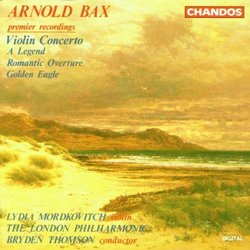| All Artists: Arnold Bax, Bryden Thomson, London Philharmonic Orchestra, Richard Nunn, Lydia Mordkovitch Title: Violin Concerto Members Wishing: 0 Total Copies: 0 Label: Chandos Release Date: 10/28/1992 Genre: Classical Styles: Chamber Music, Forms & Genres, Concertos, Theatrical, Incidental & Program Music, Historical Periods, Classical (c.1770-1830), Instruments, Strings Number of Discs: 1 SwapaCD Credits: 1 UPC: 095115900321 |
Search - Arnold Bax, Bryden Thomson, London Philharmonic Orchestra :: Violin Concerto
 | Arnold Bax, Bryden Thomson, London Philharmonic Orchestra Violin Concerto Genre: Classical
|
Larger Image |
CD Details |
CD ReviewsMore welcome Bax but lesser than his greatest K. Farrington | Missegre, France | 03/24/2000 (4 out of 5 stars) "I remember the 1960's when I was trying so hard to get hold of any vinyl with Bax's name on it. From the late Henry Stave record shop in Great Marlborough Street near Oxford Circus, I would rush home clutching my precious new purchase that might contain only 10 minutes of pure Bax on some compliation record with other English composers! Those days are happily long behind us and we can now even get a little blase with such a rich selection available and this CD is testimony to the fact that the Baxian 'biggies' are all done and the recording companies are now moving down the list to some of his lesser works. Bax turned to the more formal concerto form after his initial creative flame had burnt itself out during the 1930's. It is obvious to the true Baxophile that this inspirational spring had dried up when you compare two works like Tintagel and the Golden Eagle, the latter work being on this CD. The melodic line and orchestration are still there but the THRILL, the pure magic just seems to have totally evaporated from his work. Bax sounds superficially the same as before, the fingerprints are all there, but that edge, that Bax mystery 'Macguffin' which varied from work to work is now gone. Think of the opening violin sheen and the ostinato rhythmical sea of the opening of 'Tintagel' or the fairy celesta runs casting little spells in 'the 'Garden of Fand'. These were little touches that reveal an inspiration so powerful that its composer appeared to others as 'other-worldly'. The Bax of this CD has passed all this by now and the Violin Concerto, although rich in melody and romanticism, seems to lack those deft touches that Bax was aware had slipped away. He bemoans this fact in his autobiography written at about this time, 'Farewell, My Youth'. Bax attempted to salvage something from his diminishing powers by looking to the music of Sibelius and the bleak north for a fresh source of inspiration. Therefore during this time Bax produced a genre of 'Sturm und Drang' works which can be exemplified by much of his 6th Symphony, the piano and orchestra work, 'Winter Legends', 'The Tale the Pine Trees Knew' and represented as a genre by 'A Legend' on this CD. This terse music was successful in the sense that Bax was able to recapture some sense of drama which had gone out of his work lately and therefore was able to make something that sounded compelling. Bax had ventured into this territory years before in his tone poem 'November Woods' but in this earlier work he kept some warmth and lyricism in the middle section. However, in his later 'Nordic' works it is now all dark skies and searing tension, like giant winged things in the gray skies tearing one another apart. Whilst this is impressive it does not invoke love or rapture in me like his earlier music always does. Those slow interludes when Bax spun a beautiful tune are still there like the two early aforementioned tone poems but are now lacking the conviction they once had. 'The Golden Eagle', incidental music to a stage work written by his brother Clifford, is a collection of small Preludes that are typical late Bax, well crafted but lacking his youthful greatness. The Romantic Overture is a 1926 work for piano and orchestra dedicated to Delius written at the request of Phillip Heseltine (Peter Warlock). For me this is the best work on the CD with a lovely catchy tune at the very end. Bax stated that he had retired 'like a grocer'. I believe he had worked out that he had said everything he had wanted to say a long time before but was now caught up with his reactive official status as 'Master of the King's Musick' and of other demands which he felt obliged to look after. I am still happy to have these works but to my mind they are not worth anyone other than a true Baxian investing in. Therefore they lose a star to differentiate them from the great Bax. Beautifully played and well recorded, though and over 75 minutes of music."
|

 Track Listings (11) - Disc #1
Track Listings (11) - Disc #1